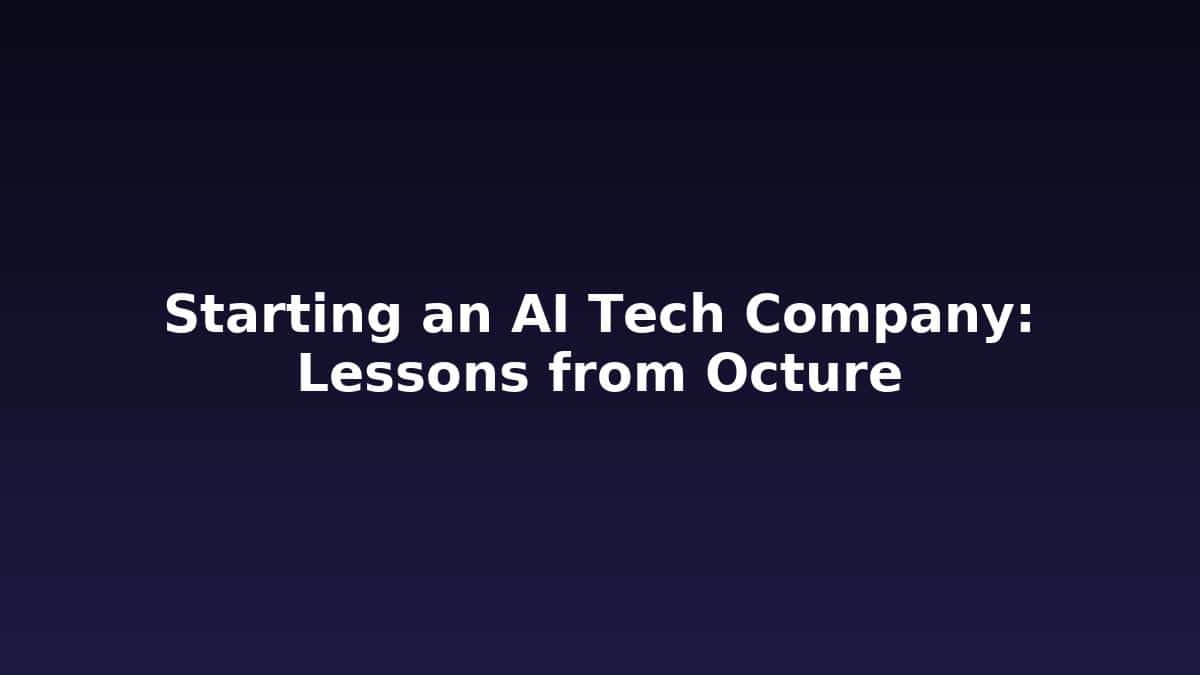Starting a tech company looks glamorous from the outside. We hear about venture funding rounds, disruptive innovations, and fast growth — but the reality is far scrappier, riskier, and more customer-obsessed than most people imagine.
Recently, I sat down with Will and Xenon, two of the founders of Octure, an AI tech startup focused on transforming the world of system integration. Their journey offers a window into what it really takes to launch and grow an AI company in today’s enterprise software landscape.
Table of Contents
ToggleFrom College Friends to Co-Founders
Will and Xenon met at Johns Hopkins University, where they and their two other co-founders studied computer science. They were friends first, entrepreneurs second — each with prior startup experience — and eventually came together to launch Octure.
The idea emerged from two worlds colliding:
- Private equity firms were pouring money into system integrators (SIs), betting on the value of ERP, CRM, and other enterprise software implementations.
- Meanwhile, Xenon’s friend was buried in a multi-year ERP project at Deloitte, sharing frequent frustrations about inefficiencies in the implementation process.
These insights revealed a huge opportunity: use AI to help SIs speed up and improve the most painful stage of implementations — discovery, requirements, and design.
Fixing a Broken Process
Octure’s AI platform streamlines the documentation and requirement-gathering phase of large enterprise software projects. Instead of months of manual workshops, spreadsheets, and endless rework, Octure’s tools bring automation and intelligence to the front end of projects.
The goal isn’t just to make SIs more efficient — it’s to help end customers realize value faster. As Will put it:
“At the end of the day, it’s about helping customers have a pleasant transformation experience. Too often, these projects fail before they even start. We’re here to change that.”
Startup Life: Scrappy, Not Glamorous
If you think starting a tech company means big offices and cushy hours, think again. The founders describe their daily routine as:
Eat. Work. Eat. Work. Sleep. Repeat.
Their customer obsession means answering calls at 1 a.m., coding features from a Denny’s parking lot, or taking meetings in hotel bathrooms during conferences.
That scrappiness is a feature, not a bug. Staying close to customers — and responding within minutes when needed — is how they differentiate themselves from larger, slower competitors.
The Hardest Parts of Building an AI Startup
Like most founders, Will and Xenon identified two consistent challenges:
- Hiring the Right Team
Building a company isn’t just about skills on a resume — it’s about finding people who believe in creating something generational. In the early stages, culture and values matter as much as technical expertise. - Learning to Say No
Every customer wants new features. Every prospect has new requests. But spreading too thin risks diluting the core product. Focus — even when it means saying no — has been one of their hardest and most important lessons.
Working with Venture Capital
Unlike the horror stories we often hear, Octure’s experience with investors has been positive. Their VC partners act as collaborators, joining strategy sessions and helping refine go-to-market plans.
But the founders are quick to clarify: raising capital isn’t the finish line — it’s just fuel. As Xenon explained:
“VC money isn’t a milestone. It’s fuel to reach the next set of goals.”
Where They’re Headed Next
Over the next three to five years, Octure wants to redefine professional services and software implementation delivery. Their roadmap starts with discovery and design, but the vision extends across the entire end-to-end process — from pre-sales to post-go-live.
If successful, they won’t just help system integrators. They’ll shift the center of gravity in enterprise transformation toward what really matters: the end customer realizing value.
Key Takeaways for Leaders
- Innovation comes from pain points. Listen to what isn’t working in your industry — that’s where opportunity lies.
- Customer obsession is non-negotiable. Responsiveness and agility are your best differentiators against established players.
- Focus beats feature creep. Saying no is often the most strategic choice.
- Funding is just fuel. The true milestone is delivering value, not raising money.
Questions to Consider
- How could AI reshape the slowest, most painful processes in your industry?
- What would your customers say if you asked them where you’re creating friction today?
- Are you focused on solving the right problems — or chasing too many at once?
🚀 At Third Stage Consulting, we work with companies navigating these same questions in their digital transformations. Whether you’re evaluating ERP, exploring AI, or rethinking how to deliver value to customers, our team offers independent, vendor-neutral guidance.
Explore more at: thirdstage-consulting.com






